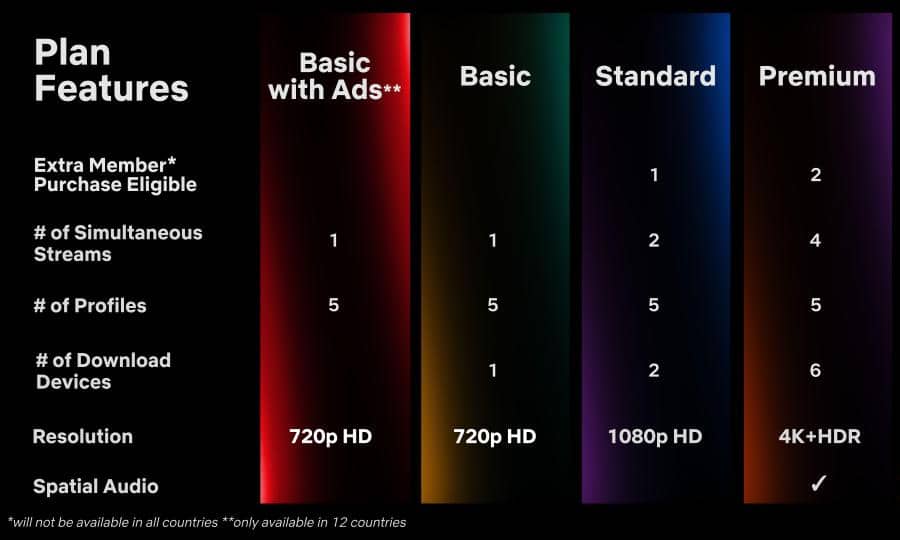Netflix Password-Sharing Crackdown is Coming to the U.S. — But Later Than It Planned
 Credit: Kaspars Grinvalds / Shutterstock
Credit: Kaspars Grinvalds / Shutterstock
Toggle Dark Mode
Netflix appears to be slightly behind schedule on its plans to crack down on the indiscriminate sharing of passwords, but company executives have confirmed it’s still on the way — and soon.
Netflix has been working to close the door on customers who share passwords too broadly for at least two years now. It initially contemplated ways to block such sharing outright before realizing last year that it could try to make money off it instead.
A little over a year ago, the streaming giant announced a new trial in Chile, Costa Rica, and Peru that would allow customers to add “extra members” to their account for less than the cost of an individual plan. While knowing what to make of that initially was difficult, it seemed like a first step in “discouraging” password sharing.
Netflix later confirmed that this is indeed the beginning of a new policy going forward, although company executives tried to put a positive spin on it by saying they weren’t trying to “shut down” sharing; they just wanted people to pay for it in some way.
If you’ve got a sister, let’s say, that’s living in a different city; you want to share Netflix with her, that’s great. We’re not trying to shut down that sharing but we’re going to ask you to pay a bit more to be able to share with her.Greg Peters, Netflix’s chief operating officer
Of course, it’s not hard to read between the lines here; creating a tier of “extra member” accounts won’t end password sharing on its own. It might encourage a few folks to “come clean,” but it’s clear that if Netflix wants to truly curtail password sharing, it will have to wield the stick and not just the carrot.
When Will Netflix Crack Down on Password Sharing?
Last year, Netflix execs hinted that they wanted to get the whole new system in place by the end of the year. Although it missed that deadline, it began rolling out the new extra member accounts to several other countries in February, including Canada, New Zealand, Portugal, and Spain.
While the timeline for a broader rollout wasn’t clear, it seems Netflix had hoped to expand it more quickly than it has. After two months of relative silence, Netflix told investors this week that it had chosen to delay the rollout to the second quarter — April to June 2023 — to “improve the experience for members.”
We could have launched broadly in late Q1, but we found enough improvement opportunities in these areas to shift a broad launch to Q2 to implement those changes. Netflix Q1 2023 Letter to Shareholders
Along with its new ad-supported tier, additional member accounts appear to have bolstered revenue for Netflix. While the company says it initially sees “a cancel reaction” when it first announces the news in a new market, the change ultimately results in more subscribers “as borrowers start to activate their own accounts and existing members add ‘extra member’ accounts.”
Netflix reports that since launching the new features in Canada, which it believes is “a reliable predictor for the US,” the paid membership base has grown larger than it was before the launch of paid sharing, and it’s continuing to grow at a faster rate than it is in the U.S.
Part of the reason for the delay in expanding paid sharing is that the company wanted to ensure it addresses “what matters to members the most,” such as ensuring people can still travel and watch content on the go, properly control access to their accounts, and transfer profiles between accounts as family relationships change.
Netflix estimates that over 100 million households are still sharing accounts inappropriately, which the company says “undermines our ability to invest in and improve Netflix for our paying members, as well as build our business.”
How Will Paid Sharing Be Enforced?
Netflix considers it inappropriate for a paid subscriber to share their password with anybody outside of their own household, and the company has made this very clear over the past few years — even if it hasn’t done much to enforce it before now.
“A Netflix account is meant to be shared in one household (people who live in the same location with the account owner).”
Some may justifiably feel there’s a bit of wiggle room for college-aged kids living away from home, but Netflix doesn’t seem to be making any exceptions for that scenario. That’s important as it will affect how Netflix decides whether somebody can use your account.
While it’s still not entirely clear how Netflix plans to go about “persuading” those who are sharing passwords to move over to their own plans, from what we’ve seen with the rollout in Canada, it appears to be mostly about tracking information like the IP addresses and device IDs that are used to access Netflix.
As things stand right now in Canada and New Zealand, Netflix subscribers who watch the service on a TV or set-top box must set a primary location, which is used to determine their “household.” Those who don’t select a primary location will have one automatically chosen for them. You’ll only be able to stream Netflix to a TV at your primary location, and although Netflix will let you update that primary location when necessary, there’s likely a limit to how many times you can do so.
For mobile devices, account holders will need to connect to Netflix from the primary location at least once every 31 days to retain their status as a member of the household. This allows folks to travel with an iPhone or iPad without problems.
Note that Netflix isn’t using GPS or any other location data in doing this. It appears it’s simply keeping track of devices used with a given account and the IP addresses they’re being used from. As long as Netflix sees your mobile device connecting from your primary location’s IP address at least once every 31 days, you should be able to keep watching unimpeded.
Netflix subscribers in the U.S. will be able to add extra member accounts for those “extended family” members who don’t qualify as part of their own households. U.S. pricing for these has yet to be announced, but in Canada, where Netflix charges the same $9.99 monthly fee for the basic plan as it does in the U.S., they’re priced at $7.99 CAD per month. Fees for extra member accounts are included in the primary account holder’s subscription.
Your household plan will also limit how many extra member accounts you can create, with only one allowed on the Standard tier, and two on the Premium tier. Extra member accounts can’t be added to the Basic or Basic with Ads tiers. Extra members get their own account and a single profile that can be used it to stream in the same quality as the primary account, but they can’t create additional profiles and can only stream from or download content to a single device at a time.








